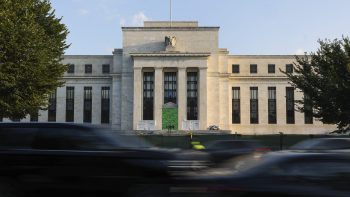Balancing the stimulus and deficit
TEXT OF STORY
Kai Ryssdal: Let’s begin today with a quick run through on the math for that eye-popping deficit number the Congressional Budget Office hit us with today. For the 2009 fiscal year — that is, the one we’re already well into — the federal deficit’s almost three times the size it was in FY ’08. That is figuring in shrinking tax revenues as well as $400 billion or so spent so far on bailouts. It does not count the Obama Administration’s stimulus plan. And the president-elect hinted today that the enormous budget shortfall means there are going to be limits on how much more the government’s going to be able to spend. Here’s our Senior Business Correspondent Bob Moon.
Bob Moon: A balancing act now confronts the incoming chief executive. Experts say his stimulus package needs to be big enough to be effective. His own advisers have said it could cost between $600 billion to $800 billion over two years. But some economists have recommended spending more than a trillion dollars.
Barack Obama: We expect that it will be on the high end of our estimates, but will not be as high as some economists have recommended, because of the constraints and concerns we have about the existing deficit.
Obama acknowledged the pressure to find budget savings. And with Medicare and Social Security costs skyrocketing, he explicitly opened the door to cuts in entitlement programs. At the Cato Institute, tax-policy director Chris Edwards wishes Obama well in reining in those costs, but also argues he shouldn’t be spending $800 billion the country doesn’t have.
Chris Edwards: I think the public really ought to start calling their members of Congress and saying, ‘Look, this has gone too far, we’re imposing all these costs on the next generation, and this is really unfair what is going on in Washington.’
Edwards concedes, though, it’s tough being a deficit hawk in the current economic climate. And former congressional adviser and budget analyst Stan Collender says the overriding political reality is the deficit will be getting even bigger.
Stan Collender: Voting against this would be voting against the equivalent of the declaration of war after Pear Harbor. This is the No. 1 issue; it’s the one mandate the president-elect got on election day. That is, fix the economy. And if this is what everyone thinks you need to fix the economy, then members of Congress are going to vote for it, regardless of the size of the deficit.
Collender says the real question is where the limit might be on how much more money America can count on borrowing from foreign investors buying U.S. Treasuries.
Collender: The truth is, we don’t know where that is, because it’s a balancing act, and we’ve never quite been in this position before.
In Los Angeles, I’m Bob Moon for Marketplace.
There’s a lot happening in the world. Through it all, Marketplace is here for you.
You rely on Marketplace to break down the world’s events and tell you how it affects you in a fact-based, approachable way. We rely on your financial support to keep making that possible.
Your donation today powers the independent journalism that you rely on. For just $5/month, you can help sustain Marketplace so we can keep reporting on the things that matter to you.


















